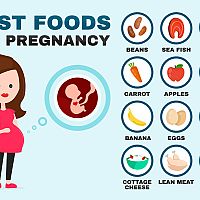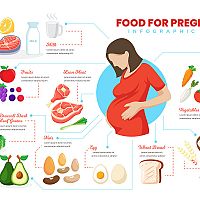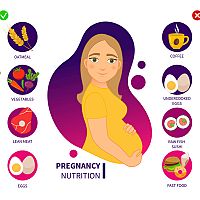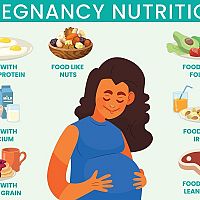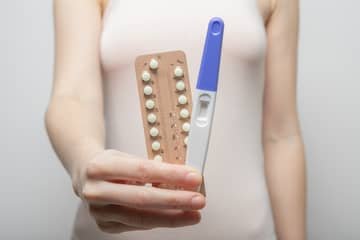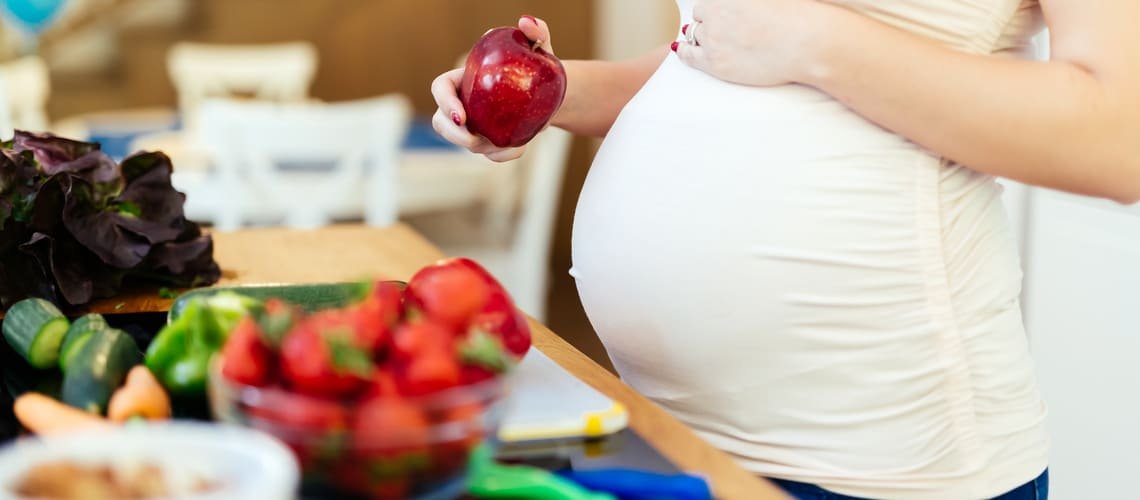
What not to eat during pregnancy. Forbidden foods for pregnant women - leave out raw meat and alcohol
The menu during pregnancy requires certain changes. On the Internet, you will find many articles about what foods are inappropriate during pregnancy, what a pregnant woman cannot eat, and paradoxically, you will also find conflicting information. It is true that the tastes of pregnant women are diverse. What does not harm one woman during pregnancy, can cause digestive problems or even other health problems for another. Alcohol during pregnancy is strictly prohibited, but what about nuts, mushrooms or bryndza during pregnancy? Which foods are okay and what to avoid during pregnancy?
- Diet during pregnancy – 1st trimester
- What not to do during pregnancy - no diets or feasts
- Fluid intake in pregnancy
- What not to eat during pregnancy?
- Smoking and alcohol in pregnancy
- Pain and medication in pregnancy
- Folic acid and vitamins for pregnant women
- No experiments
- Experiences
- The most frequent questions - FAQ
- Comments
A person "googles" a lot on the Internet, sometimes so much that he doesn't really know what to take from it. A proper lifestyle during pregnancy is not only important for the baby, but also for the mother-to-be. Although pregnant women often hear about what not to eat during pregnancy, the bottom line is that unsuitable foods during pregnancy are limited in order not to cause unnecessary complications during pregnancy. You will also read what to watch out for in the first trimester. What is specific about the diet during pregnancy? Which foods are unsuitable and why be careful with vitamins for pregnant women ?
Diet during pregnancy – 1st trimester
Despite certain restrictions, it is important that the diet during pregnancy is varied and balanced. Just like before pregnancy, a woman must consume a sufficient amount of proteins, carbohydrates, fats, fiber and vitamins. Due to more frequent states of nausea and loss of appetite, especially in the 1st trimester of pregnancy, it is good to get used to eating small amounts, say 5-6 portions of food a day. Pregnancy is not a disease, and remember that if you have to skip something from your diet, it is for the health of the baby or your well-being.
From this point of view, the most sensitive period in pregnancy is the 1st trimester. What to watch out for in the first trimester? In addition to limiting physical exertion, avoid certain foods already in the first three months of pregnancy. Completely say goodbye to alcohol and cigarettes. In both cases, these are harmful substances that pass through the placenta, which nourishes the child. Such substances can be toxic and very dangerous for the development of the child, since in the 1st trimester the child develops important organs, including the brain. In the first trimester, completely limit your intake of caffeine and certain herbs and spices, such as saffron, marjoram, cinnamon, ligurian, chili or celery. You don't have to worry about honeysuckle, chamomile (if you don't have an allergy), nettle or calendula. Peppermint is fine for soothing the stomach, but avoid regular consumption. The same applies to ginger.

What not to do during pregnancy - no diets or feasts
Since the second trimester, the needle on the scale has been going up and it seems to you that you should slow down on your food intake, because otherwise you will be like a balloon? The myth that you should eat for two is not entirely true, but definitely do not try any reduction diets that will miraculously keep you in shape. A pregnant woman must realize that a little person in the belly means that the body weight will naturally increase. For some women it is more, for others less kilograms. Weight gain is also closely related to the weight you start with during pregnancy. For example, overweight women usually gain less weight than underweight women. However, this is very individual.
A pregnant woman and a baby in the womb need a rich diet in sufficient quantity. Diets to maintain a slim line during pregnancy are meaningless, so put them out of your mind for at least 9 months. On the other hand, the other pole in the sense of overeating is not the right strategy either. You may develop obesity (disease), problems with high blood pressure or gestational diabetes. Everything in moderation, no reduction diets or mindless overeating.
Fluid intake in pregnancy
The drinking regime during pregnancy is even more important than under normal circumstances. Focus primarily on the intake of unsweetened beverages. The body of a pregnant woman retains more water, but despite the fact that it seems to you that hydration is not good for you, know that sufficient hydration is very important for the body. In connection with lack of appetite, it happens that expectant mothers do not feel like not only eating, but also drinking. Try slightly sparkling water, teas or pure water with a slice of lemon. A glass of Coca cola is also not a sin, but definitely do not replace your drinking regime with it. In addition, it contains caffeine, the intake of which should be limited during pregnancy. No alcohol (wine, beer) and energy drinks should be part of the drinking regime. The daily fluid intake should be at least 2 liters.
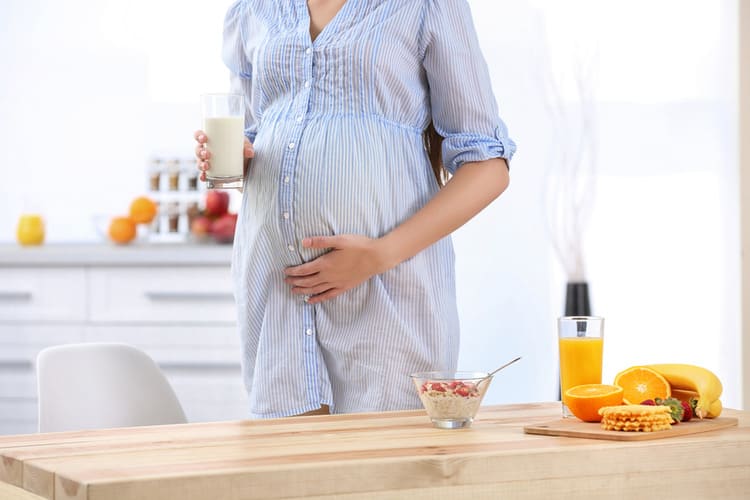
Tea, caffeine and coffee
Tea culture during pregnancy is relatively common. Drinking tea during pregnancy is good, because pure water often does not go "down the throat" of mothers. At least the teas have some flavor and that's why moms like them better. It is ideal to drink tea unsweetened. It is important to have a healthy balance in this regard as well. Even teas and tea mixtures can contain caffeine, the high intake of which during pregnancy can increase the risk of miscarriage, cause palpitations or increase blood pressure. Above all, green and black tea during pregnancy is inconspicuous from this point of view, while green and black tea leaves contain thein, which is actually another name for caffeine in tea.
Therefore, prefer pure herbal teas. Lime tea during pregnancy is great for colds, as is honeydew. Nettle during pregnancy relieves digestive difficulties, similar to fennel. Sea buckthorn and dandelion teas are also very suitable, and once in a while ginger or mint tea won't hurt either. However, the primary source of fluids should still be mainly water.
Based on various researches, it is recommended not to exceed a maximum of 200-300 mg of caffeine per day. It is quite difficult to determine whether it is 1, 2 or 3 cups of coffee a day, considering the different types of coffee, where the caffeine content can be very different. So if you can't imagine a day without caffeine, try making a weaker coffee and enjoy one or two cups a day. Try decaffeinated coffee, which contains only trace amounts of caffeine. If you drink both tea and coffee, be careful not to underestimate the amount of caffeine. The negative impact on sleep is a very common phenomenon in this case.
What not to eat during pregnancy?
Eating a balanced diet during pregnancy includes all important food components. Unfortunately, the diet for pregnant women also has its limitations. At the same time, it is very difficult to determine exactly what not to eat or drink during pregnancy, because every pregnant woman's body reacts differently to specific foods. From a professional and practical point of view, there are certain inappropriate foods during pregnancy that you should definitely avoid and rather exclude or at least limit them from your diet plan. The reason is not only the fact that the given food can cause you digestive problems, it is also about not endangering the development of the fetus and the health of your baby. We will now imagine foods to avoid, but at the same time we will advise you which types of food are suitable during pregnancy.
- Raw or uncooked meat products, smoked foods, pates, liver or raw eggs.
- Seafood, raw fish, sushi or canned fish products.
- Unpasteurized dairy products
- Unwashed vegetables or fruits.
- Sweets and confectionery with a high content of refined sugar, dyes and preservatives.
- Certain types of herbs and spices (sage, aloe, rosemary, chestnut, juniper, motherwort...).
- Instant meals, semi-finished products and fast food.
- Alcohol or mixed alcoholic beverages.

Suitable and unsuitable fruits and vegetables
In the case of fruits and vegetables, it is doubly true that thorough hygiene should not be neglected, even in the case of packaged foods. The occurrence of parasites and bacteria can be a breeding ground for the spread of toxoplasma, listeria or other pathogens. Fruits and vegetables are a rich source of vitamins, minerals and fiber, so they should clearly not be absent from a pregnant woman's diet. Do not avoid apples, blueberries (antioxidants), plums or bananas (fructose - carbohydrates).
Get vitamin C easily from citrus fruits. Orange or grapefruit in pregnancy do not represent a complication, but it is important to monitor your possible reaction to their consumption. Avocados during pregnancy are considered by experts to be a great choice because they contain healthy fats, fiber, omega-3 fatty acids, antioxidants and vitamins B, K, E. You don't have to be afraid of dried fruit either. As for pineapple or kiwi, they are often perceived as allergens, but if you do not have a problem with allergies to these foods, everything should be fine. Try smaller doses, if they do not harm you, feel free to indulge in them - they are a great source of potassium, iron and magnesium.
Sweet potatoes, classic potatoes, pumpkin, zucchini, spinach, or watermelon during pregnancy are a perfect source of vitamins and fiber. Don't be afraid of leafy vegetables, such as kale, broccoli, cabbage, arugula or the aforementioned spinach. Carrots or kohlrabi during pregnancy can also be a suitable delicacy. You can also treat yourself to vegetable or fruit nutrition, which you can prepare at home.
Spices and herbs
We can consider honeysuckle, nettle, dandelion, fennel or sea buckthorn as suitable herbs. Linden tea is great for a cold, honeydew soothes and helps you sleep better. Fennel, on the other hand, will significantly help with stomach problems. Ginger does not harm pregnant women, but it is not an ideal food for regular consumption, due to its pungent taste and strong aroma. Ginger tea is not bad to help with a cold, avoid excessive consumption. The same applies to mint. Cinnamon in smaller quantities does not interfere during pregnancy, but in some pregnant women, its strong aroma can induce vomiting. Spicy or overly aromatic foods are not recommended during pregnancy, so beware of curry, chili or various aromatic spice mixtures.
Such sage during pregnancy is only suitable for external use. Also avoid herbs such as aloe, rosemary, basil, ligurine, saffron, St. John's wort, celery, mouse's tail (ladder), cloves, chestnut, juniper or motherwort. All of them have a certain effect on the body of a pregnant woman, while some can cause mild poisoning, trigger contractions, increase blood pressure, irritate the kidneys or cause unpleasant digestive problems. If you are going to buy herbal teas - mixtures, always study what the given mixture contains, or consult your doctor.
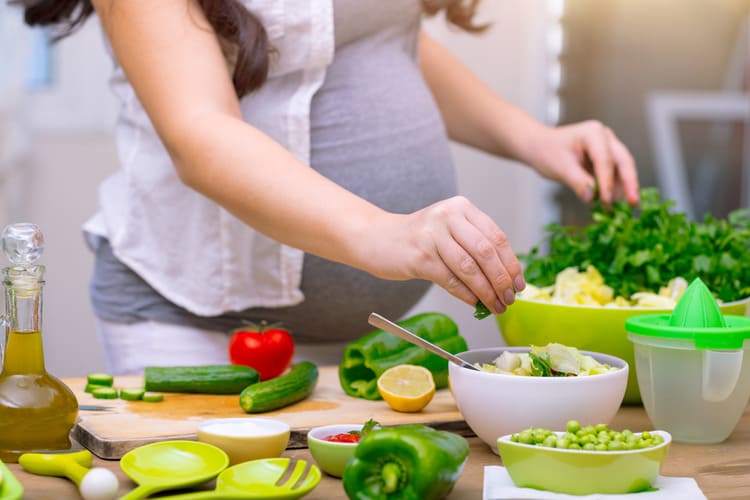
Mushrooms in pregnancy
As for champignons or mushrooms in pregnancy, but also other mushrooms and mushrooms, their big disadvantage is that many of them are like "sponges". They can bind toxic substances and, in addition, they are very difficult to digest and can cause discomfort. In the case of champignons and oyster mushrooms, these are relatively safe mushrooms that are not among the risky ones. However, it is still true that their consumption should always be in moderation. Precise hygiene and unconditional heat treatment are necessary. Do not consume mushrooms during pregnancy if you developed allergies or digestive problems after eating them before pregnancy.
Unpasteurized milk and milk products
Unpasteurized milk can increase the risk of infection with pathogens or viruses during and outside of pregnancy. Most often, toxoplasmosis or listeria can spread in this way. Know that in the 1st trimester, such an infection can cause serious damage to the fetus and even miscarriage. Therefore, avoid unpasteurized dairy products, i.e., those for the production of which milk was used without heat treatment. For example, soft and moldy cheeses such as brie, gorgonzola, roquefort, camembert or unpasteurized bryndza are unsuitable.
Dairy products are a perfect source of calcium and protein. Feel free to enjoy cheeses such as mozzarella, cheddar, parmesan, cottage cheese or goat, cow and sheep cheeses made from pasteurized milk. Also white yogurts, cottage cheese or low-fat milk, the essence is that they undergo heat treatment.
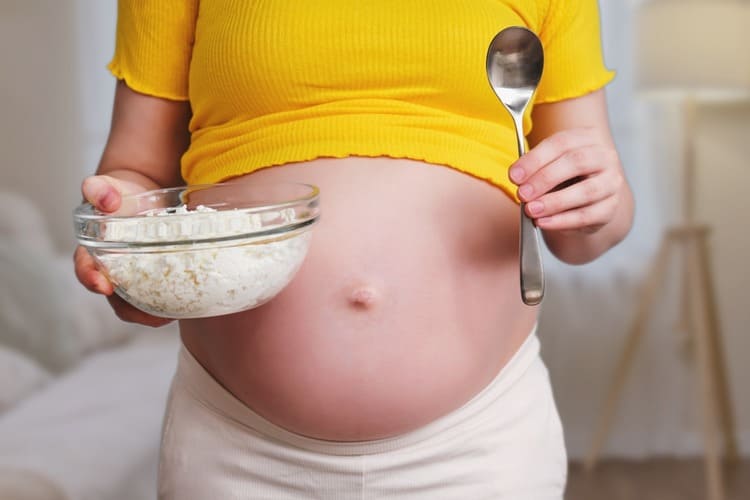
Meat, liver and eggs during pregnancy
It is best to consume lean white meat - chicken, turkey or rabbit. Feel free to treat yourself to pork or beef, but the important thing is that all meat and meat products undergo proper heat treatment. Raw meat poses the greatest risk of toxoplasma infection, and other dangerous parasites and bacteria can also be transmitted. You will have to forgive yourself for tartare or bloody steak. It is better to omit smoked meat products from the menu.
Meatballs or sausages do not pose a problem during pregnancy as long as they undergo proper heat treatment. Risky meat products are pates and other meat spreads, where it is important that the meat components undergo proper heat treatment. Pâtés and lunchmeats are generally recommended to be avoided during pregnancy. The same applies to offal and dishes made from it, roast during pregnancy (note: liver offal) must undergo a heat treatment process. You should completely avoid raw eggs, soft-boiled eggs or mayonnaise, which can be a source of salmonellosis.
Fish and seafood
The risk of some sea fish can be the presence of mercury in their organism. They are a great source of iodine, iron and calcium. Focus on fish such as salmon, tuna or trout. Fish does not have to be on the daily agenda, it is enough if you just enrich the diet with them. Avoid eating shark meat. You will have to deny yourself sushi, do not eat raw fish as a rule. Avoid seafood (shrimp, oysters, mussels...) in any form. They have a high protein content, but are a strong allergen.
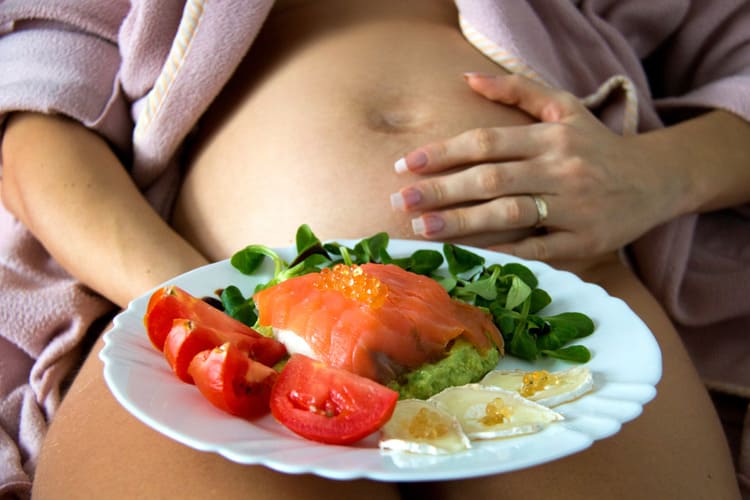
Nuts and legumes during pregnancy
Don't be afraid of nuts. If you are not allergic to specific nuts or seeds, you certainly do not have to avoid them completely during pregnancy. It is true that these are significant allergens, but if you do not experience digestive problems or other allergy symptoms after consuming them, do not worry. Pistachios, cashews, hazelnuts, almonds or chia seeds are a great source of omega-3, healthy fats, fiber, but also iron, magnesium or folic acid.
Although peanuts are generally considered to be nuts, they actually belong to the group of legumes. Lentils, chickpeas, beans, peas or soy also belong here. Legumes are a great source of folic acid, calcium and fiber. Do not omit them from your diet during pregnancy, but be careful with the amount. They cause bloating and flatulence, which is not very pleasant for pregnant women. If some of the nuts or legumes cause you certain allergic reactions or difficulties, remove them from the diet, because they can cause similar reactions in the baby.
Smoking and alcohol in pregnancy
A pregnant woman must stop smoking as soon as she finds out she is pregnant. Nicotine is a very dangerous substance that can reach the fetus directly through the placenta. Also avoid environments where there is a risk of inhaling nicotine products. No, even electric cigarettes are not suitable during pregnancy. You should be equally strict about the ban on drinking alcohol during pregnancy. Scientific studies have dealt with the effect of alcohol on the fetus, but it is not possible to determine which level of alcohol is harmless and which, on the contrary, is not. However, harmful substances from alcohol pass through the placenta and can reach the fetus. This can result in a disorder in the development of organs or they can later cause metabolic disorders in the body.

Pain and medication in pregnancy
Taking medication during pregnancy is always advisable to consult with your gynecologist. Different types of drugs can also affect the pregnancy itself or the fetus. If you were taking certain preparations even before pregnancy, you should consult your doctor about whether it is appropriate to continue using them or whether you need to look for an alternative. Medications such as Paralen or Novalgin, which relieve pain, have not shown in practice any effects on pregnancy or the health of the baby. In any case, the use of such drugs is always consulted with a doctor. Even in the case of over-the-counter preparations, herbal preparations or food supplements.
Folic acid and vitamins for pregnant women
The intake of vitamins during pregnancy is very important. It is ideal to receive them from the regular diet. However, it is not always possible to obtain vitamins and minerals for the body in a natural way. Therefore, various vitamin supplements are available for pregnant women, which either contain a complex spectrum of vitamins and minerals, or allow to supplement a specific vitamin or mineral that a woman lacks. The choice of vitamins is also consulted with your doctor. If you lack certain vitamins or components, the doctor will recommend which vitamin supplements are proven and suitable for pregnant women.
One of the most widespread vitamins is folic acid for pregnant women, which has a very positive effect on the fetus and the body of a pregnant woman. Especially in the 1st trimester, the optimal level of vitamin B9 (folic acid) contributes to the prevention of disorders in the development of the fetus (prevents cleft spine or palate or neural tube defects). The usual dose is around 200 to 400 micrograms, during pregnancy it is recommended to increase the dosage to 600 to 800 micrograms.
Another suitable supplement is, for example, probiotics during pregnancy, which have been proven to reduce the risk of developing allergies in children after birth. Probiotics contain live cultures of bacteria that increase immunity and facilitate digestion.
No experiments
We do not recommend future mothers to experiment during pregnancy. If you know that you had a bad reaction to certain foods even before pregnancy, simply leave them out of your diet and don't try them even during pregnancy. It is good to listen to your body and if inappropriate reactions of your body appear, constipation, diarrhea, allergic reactions, do not tempt your body further. You will only harm yourself and the baby. It is also not necessary to include in the menu everything that is recommended for pregnant women to eat. Stick to the principle, everything in moderation, eat more often in small portions and don't stick to the myth that you have to eat for two. Try to eat healthy, not to overeat and follow a certain diet. Although it is sometimes difficult, it is for your own good and the good of your baby.
Experiences
Everything in moderation - most mothers would agree. Except for raw meat, unpasteurized dairy products, moldy cheeses and alcohol, everything is allowed, of course, only if it does not harm you. It is very individual what a woman can and cannot eat during pregnancy. Mushrooms are harmful to some, while meat is not good for others during pregnancy. You should always try in moderation what suits you.
The most frequent questions - FAQ
What not to eat and not to drink during pregnancy? What fruit is suitable during pregnancy? Can champignons harm me during pregnancy? The answers to these questions can be found in the article. However, if you have other questions, feel free to ask in the discussion below the article. We will be very happy if you share your experiences, advice and observations with eating during pregnancy in the comments and maybe give advice to other future mothers who are interested in this topic.
What not to eat during pregnancy, which foods are prohibited?
Are mushrooms dangerous during pregnancy?
Can I consume olives during pregnancy?
Is it allowed to drink wine during pregnancy?
Can I eat poppy seeds during pregnancy?
Gallery
Pridať komentár


